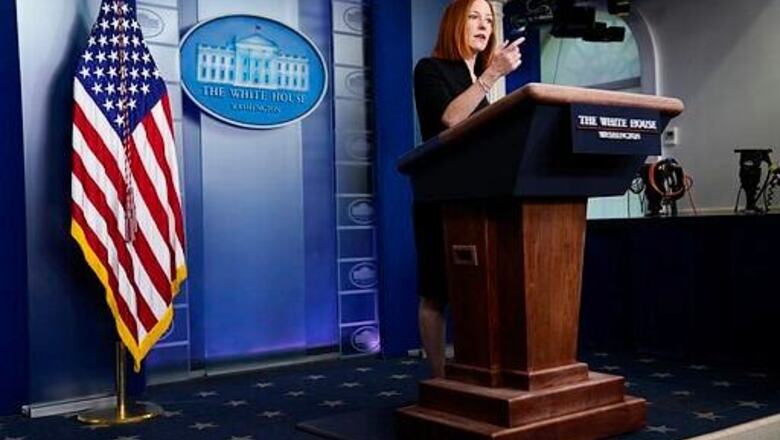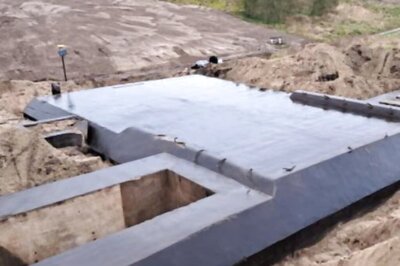
views
WASHINGTON: Beyond roads and bridges, President Joe Biden is trying to redefine infrastructure not just as an investment in America the place, but in its workers, families and people.
As the president prepares to unveil his Build Back Better package Wednesday in Pittsburgh, new details and proposals are emerging of a massive investment on par with the New Deal or Great Society programs.
Swelling to $3 trillion or $4 trillion, with taxes to pay for it, the new package is transforming the old ideas of infrastructure investment into a 21st century concept that includes developing the human capital of America’s population.
Hes talking about physical infrastructure and were talking about human infrastructure, Sen. Bernie Sanders said in an interview Tuesday.
Sanders is encouraging the White House to go even further by lowering the Medicare eligibility age from 65 to at least 60 and expanding its health benefits to include dental care, eye glasses and hearing aids for seniors.
I think the president understands that we have enormous structural problems in how we protect working families in this country,” he said.
The White House is taking a two-pronged approach to this next big package. Biden is rolling out the proposed traditional infrastructure investments Wednesday, with more proposals to come to expand child care, pre-kindergarten education and other domestic investments.
The White House hopes to take a more deliberate and collaborative approach with the lawmakers than it did on the emergency COVID-19 rescue package, his first big priority to be signed into law.
Republicans are already panning the package as too big and too costly for them to support.
It seems like President Biden has an insatiable appetite to spend more money and raise peoples taxes, said Rep. Steve Scalise of Louisiana, the GOP whip, in an interview.
Scalise predicted that, if approved, the new spending and taxes would start having a negative impact on the economy, which were very concerned about.
Sweeping in scope, the ambitious plan aims to make generational investments in infrastructure, revive domestic manufacturing, combat climate change and keep the United States competitive with China, according to administration officials.
Though the White House is emphasizing the urgency, it also insists this will not be considered an emergency response like the $1.9 trillion virus relief bill that Biden signed into law over Republican objections in mid-March. The administration wants to see progress on the new legislation by Memorial Day and have it passed over the summer, White House officials said.
Biden’s approach is about making an investment in America, said White House press secretary Jen Psaki.
Not just modernizing our roads, our railways and our bridges, but building an infrastructure of the future, she said, pointing to broadband access and the “needs in people’s homes and communities.”
The administration is setting the political pace and tone for this next big priority in Biden’s agenda. The COVID-19 bill, though broadly popular with voters of both parties, exposed the president to criticism for going it alone with only Democratic votes. White House officials believe this time there will be far more opportunity to win some GOP support and plan significant outreach on Capitol Hill.
As the committees in Congress begin to tackle individual provisions including those on transportation, China and others the White House will encourage those efforts. Then it will work through the tax increases separately, according to officials.
Psaki said the president believes theres more that can be done to make the corporate tax code fair, to reward work not wealth, to ensure that we can invest in the future industries that are going to help all people in this country.
While hoping for collaboration, Democratic congressional leaders are also preparing a go-it-alone strategy, much as was done in the virus aid package, in case Congress hits a wall of GOP opposition.
Infrastructure gives Biden an opportunity to succeed on an issue where both his predecessors Barack Obama and Donald Trump made big promises that never came to fruition.
The multitrillion-dollar price tag means that any package will eventually need to be paired with tax hikes, unwinding Trumps 2017 corporate tax rate cuts. Biden has vowed not to raise taxes on households earning less than $400,000 a year.
But with the House narrowly controlled by Democrats and the Senate split 50-50, Biden has little room for error with his own party.
Already some progressive Democrats are pushing for more while centrist Democrats are complaining about the size and scope.
Rep. Josh Gottheimer, D-N.J., and two House colleagues said Tuesday they would vote against any tax changes in Biden’s plans that did not include a repeal of the cap on state and local tax deductions from the 2017 GOP tax law that hits residents in their states.
Disclaimer: This post has been auto-published from an agency feed without any modifications to the text and has not been reviewed by an editor
Read all the Latest News, Breaking News and Coronavirus News here. Follow us on Facebook, Twitter and Telegram.




















Comments
0 comment